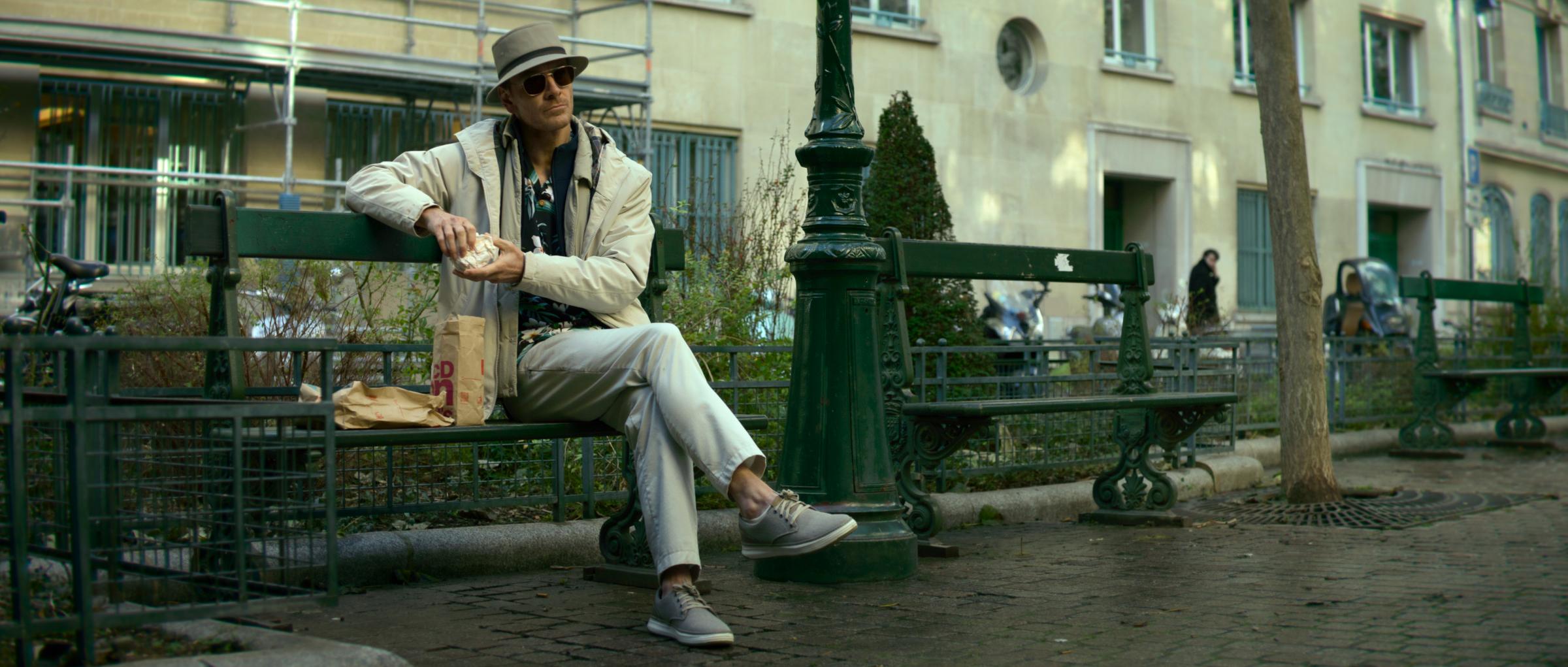With roughly 30 minutes to go in David Fincher’s new thriller The Killer, two assassins go to dinner. We’ve just spent an hour and a half with Michael Fassbender’s titular unnamed killer, forced to listen to his discursive voiceover musings on the meaninglessness of life and the need for focus and control in the field of high-end contract killing. Throughout that time, there’s dialogue, sure, especially during the killer’s confrontation with his handler Hodges, played by Charles Parnell. But here, over a dimly-lit dinner at a gourmet restaurant in Beacon, N.Y., the killer looks his victim in the eye and finds himself searching for a sign of soullessness, something to confirm he’s making the right choice—only to see someone not so different from himself.
Of course, an extended monologue from the unnamed “expert” (Tilda Swinton)—each killer is identified not by name but by their strength in the field—is nowhere near enough to change Fassbender’s mind. His goal remains the same: he wants to kill her as revenge for the savage assault she and her partner, the “brute,” inflicted on his girlfriend (Sophie Charlotte). (That attack is itself a result of his botched hit that kicks the plot into gear). After dinner, they take a stroll. When the expert trips on an icy staircase, she asks her soon-to-be killer for a hand; without thinking twice, he promptly shoots her in the head, and we see a hidden dagger fall from her hand. For the killer, it’s yet another example of his strict code paying off. “Trust no one,” he says in voiceover, echoing the other times in the film when he repeats his rules to himself. “This is what it takes if you want to succeed.”
But before the scene reaches that inevitable conclusion, the killer spends some time quietly, patiently watching the expert enjoy her last supper. It’s a change of pace for him; as she herself points out (using a darkly funny grizzly bear metaphor), confronting her in a public place like this is a big risk for a man typically focused on not attracting attention. While Fassbender keeps the character’s facial expressions carefully controlled—there’s no empathetic nodding here, not a flicker of pity or regret about what he’s here to do—we grow to learn something about him by watching another assassin ramble.
Read more: Less Is More in David Fincher’s Assassin Thriller The Killer

It’s no surprise that Swinton’s scene is one of the strongest, if not the most chilling, in the movie. Her performance allows us to immediately see the expert as a real person, a character who could anchor her own version of this story. “I’ve been so good for so long,” she remarks. “I’m suddenly regretting not having Häagen-Dazs with every meal.” Later, she faintly muses, “Last minutes spent knowing they’re last minutes. I wouldn’t wish it on my worst enemy.”
Read more: Here’s Everything New on Netflix in November 2023
In the end, it’s not just the expert’s characterization, and Swinton’s portrayal, that makes this sequence so effective. It’s how it reflects the killer, who remains almost entirely silent throughout the scene. Here’s somebody with the same profession and same essential code as himself, justifying an act of needless cruelty with the same rationalization he uses. Nothing is ever personal when you’re a contract killer. It’s all a cycle: he can come to this dinner seeking reassurance that the woman he’s killing is unequivocally bad, but he’s bad in all the same ways. As she points out, he’ll look oblivion in the eye one day, too. When he does, he’ll think of her.
After years of killing efficiently and guiltlessly, the killer’s heart has long since calcified, leaving behind a cold man incapable of really internalizing the humanity of other people who aren’t part of the family he already has. He knows who he is. But even if the expert’s words do nothing to fundamentally change his M.O., you get the sense that she does get through to him in some small way. Staring at the woman who helped brutalize someone he loves, the killer doesn’t see a helpless victim, but he doesn’t see a cartoonish monster, either. He just sees a person, as flawed and as mortal as anyone else—himself included.
More Must-Reads from TIME
- Caitlin Clark Is TIME's 2024 Athlete of the Year
- Where Trump 2.0 Will Differ From 1.0
- Is Intermittent Fasting Good or Bad for You?
- The 100 Must-Read Books of 2024
- Column: If Optimism Feels Ridiculous Now, Try Hope
- The Future of Climate Action Is Trade Policy
- FX’s Say Nothing Is the Must-Watch Political Thriller of 2024
- Merle Bombardieri Is Helping People Make the Baby Decision
Contact us at letters@time.com